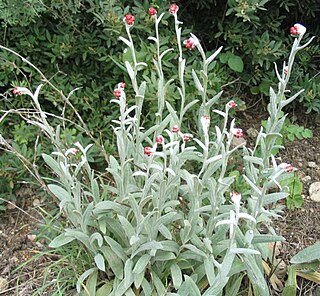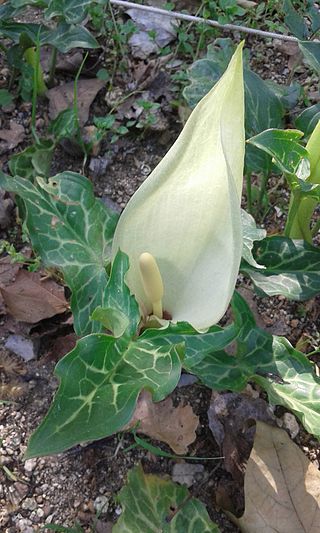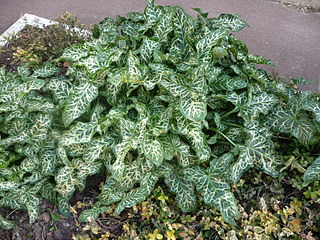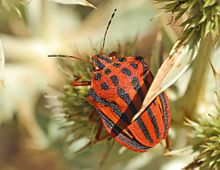
Pentatomidae is a family of insects belonging to the order Hemiptera, generally called shield bugs or stink bugs. Pentatomidae is the largest family in the superfamily Pentatomoidea, and contains around 900 genera and over 4700 species. As hemipterans, the pentatomids have piercing sucking mouthparts, and most are phytophagous, including several species which are severe pests on agricultural crops. However, some species, particularly in the subfamily Asopinae, are predatory and may be considered beneficial.

The genus Helichrysum consists of an estimated 600 species of flowering plants in the sunflower family (Asteraceae). The type species is Helichrysum orientale. They often go by the names everlasting, immortelle, and strawflower. The name is derived from the Anicent Greek words ἥλιος and χρῡσός.
Panicum italicum may refer to two different species of plants:

Echium is a genus of flowering plants in the family Boraginaceae that contains about 70 species and several subspecies.

Helichrysum italicum is a species of flowering plant in the family Asteraceae. It is sometimes called the curry plant because of the strong smell of its leaves. Other common names include Italian strawflower and immortelle. It grows on dry, rocky or sandy ground around the Mediterranean. The stems are woody at the base and can reach 60 centimetres (24 in) or more in height. The clusters of yellow flowers are produced in summer, they retain their colour after picking and are used in dried flower arrangements.

Zodarion italicum is a European ant-eating spider. Like the closely related Z. hamatum, it is nocturnal and captures various ant species. Z. italicum seems to be specialized in Formicinae ants. Both species are generalized mimics of orange-dark brown ants, such as Lasius emarginatus.

Arum italicum is a species of flowering herbaceous perennial plant in the family Araceae, also known as Italian arum and Italian lords-and-ladies. It is native to the British Isles and much of the Mediterranean region, the Caucasus, Canary Islands, Madeira and northern Africa. It is also naturalized in Belgium, the Netherlands, Austria, Argentina, North Island New Zealand and scattered locations in North America.

Ius Italicum was a law in the early Roman Empire that allowed the emperors to grant cities outside Italy the legal fiction that they were on Italian soil. This meant that the city would be governed under Roman law rather than local law, and it would have a greater degree of autonomy in their relations with provincial governors. As Rome citizens, people were able to buy and sell property, were exempt from land tax, and the poll tax and were entitled to protection under Roman law. Ius Italicum was the highest liberty a municipality or province could obtain and was considered very favorable. Emperors, such as Augustus and Septimius Severus, made use of the law during their reign.
Penicillium ulaiense is a plant pathogen that causes whisker mould. It is considered an important infection of citrus fruit, especially in packinghouses. P. ulaiense is a citrus postharvest pathogenic fungus described as a member of the serie Italica, together with P. italicum. In 1987, mycologists in Taiwan published a description of P. ulaiense. Authors familiar with green and blue moulds of citrus had mistaken the fungus for P. italicum and dismissed its unique features as variations due to particular environmental conditions. To date, P. ulaiense has been reported in Argentina, Arizona, Australia, California, Florida, Italy, New Zealand, South Africa, Taiwan, and Texas. In recent times, P. ulaiense has been reported in Egypt as a postharvest pathogen of orange fruit.

Graphosoma italicum is a species of shield bug in the family Pentatomidae. It is also known as the Striped bug and Minstrel bug.

Graphosoma lineatum is a species of shield bug in the family Pentatomidae.

Graphosoma is a genus bugs in the family Pentatomidae. They are commonly known as striped shield bugs for their distinctive markings.

Hainich National Park, founded on December 31, 1997, is the 13th national park in Germany and the only one in Thuringia. One of the main objectives of the park is the protection of an ancient native beech forest. In 2011, the park was added to the Ancient and Primeval Beech Forests of the Carpathians and Other Regions of Europe World Heritage Site because of its testimony to the ecological history of the beech tree and the dynamics of forests in Europe since the Last Glacial Period.

Echium italicum, the Italian viper's bugloss, Lady Campbell weed, or pale bugloss, is a species of plant from the family Boraginaceae, found in the Mediterranean Basin and, as an introduced species in the United States.

The Italian electoral law of 2015, also known as Italicum, was an Italian electoral law passed in 2015. The law, which came into force on 1 July 2016, regulated only the election of the Chamber of Deputies, replacing the Italian electoral law of 2005, which had been ruled partly unconstitutional by the Constitutional Court of Italy in December 2013. It provided for a two-round system based on party-list proportional representation, including a majority bonus and a 3% election threshold. Candidates would have run in 100 multi-member constituencies using open lists. The largest party which won over 40% of the vote would automatically win a majority of seats; if no party won 40% of seats, a second round of voting would be held between the two largest parties, with the winner of the second round winning a majority of seats. The name "Italicum" was coined in 2014 by Democratic Party secretary and later Prime Minister of Italy, Matteo Renzi, who was one of the legislation's main proponent.

Forum Italicum, subtitled as, 'A Journal of Italian Studies', is a peer-reviewed academic journal that publishes papers twice a year in the field of Cultural Studies and Italian Studies. The journal's Editor is Giuseppe Gazzola. It has been in publication since 1967 and is currently published by SAGE Publications in association with The Center for Italian Studies at Stony Brook University, New York.

The Italian electoral law of 2017, colloquially known by the nickname Rosatellum bis or simply Rosatellum after Ettore Rosato, the Democratic Party (PD) leader in the Chamber of Deputies who first proposed the new law, is a parallel voting system, which acts as a mixed electoral system, with 37% of seats allocated using a first-past-the-post electoral system and 63% using a proportional method, with one round of voting. The Chamber and Senate of the Republic did not differ in the way they allocated the proportional seats, both using the largest remainder method of allocating seats.
Dendrocoelum italicum is a cave-adapted freshwater planarian which is endemic to Bus del Budrio cave in the Italian Prealps.
Arum italicum subsp. albispathum is a flowering plant subspecies in the family Araceae.

Arum italicum subsp. italicum is a flowering plant subspecies in the family Araceae.















